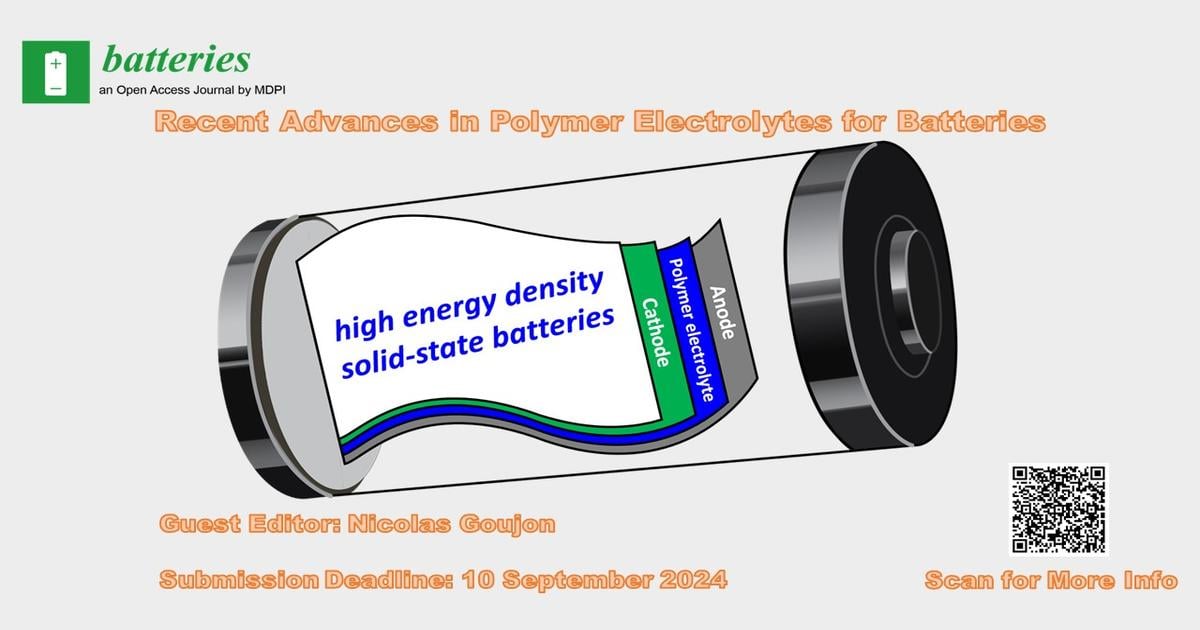Recent Advances in Polymer Electrolytes for Batteries
A special issue of Batteries (ISSN 2313-0105). This special issue belongs to the section "Battery Materials and Interfaces: Anode, Cathode, Separators and Electrolytes or Others".
Deadline for manuscript submissions: closed (10 September 2024) | Viewed by 2398

Special Issue Editor
Special Issue Information
Dear Colleagues,
Batteries will play a key role in the efficient transition of the technology associated with the energy and transport sectors towards a carbon-neutral economy, which is essential for the fight against climate change. The lithium-ion battery has emerged as the state-of-the-art technology for applications, ranging from small handheld electronics to electric vehicles and stationary energy storage. However, the current lithium-ion battery technology has reached its practical limits in terms of energy density and has recently raised safety concerns due to the flammability of the traditional liquid-based electrolyte. Over the last decades, various alternative high-energy density battery technologies have been proposed, such as lithium metal, alkali metal-air, sulphur and silicon batteries. The use of traditional liquid-based electrolytes in conjunction with these high-energy density active materials is challenging due to various factors, such as the degradation of the electrolyte in contact with active materials, inability of traditional liquid-based electrolytes to form stable solid electrolyte interphase and active material dissolution issues. Additionally, a high-modulus solid electrolyte has been shown to enable the use of a lithium metal anode, which is critical for the development of high-energy density batteries. Polymer electrolytes have emerged as a promising alternative to traditional liquid-based electrolytes due to their inherent proprieties, such as process-ability, good physio-chemical stability and low flammability, enabling the use of the aforementioned high-energy density active materials. This Special Issue aims to highlight the recent advances in polymer electrolytes for application in high-energy-density battery technologies.
Potential topics, but not limited to, are:
- Solid polymer electrolyte;
- Ionogel electrolyte;
- Block copolymer electrolytes;
- Single ion conducting polymer electrolytes;
- Alkali metal salt for solid-state electrolyte;
- Hybrid polymer electrolytes;
- Elucidation of the ionic dynamic and speciation in solid-state electrolytes;
- Solid electrolyte interphase;
- In-situ and operando characterization of all solid-state batteries;
- Solid-state electrolyte processing;
- Lithium metal batteries;
- Alkali metal-air batteries;
- Lithium Sulphur batteries;
- Solid-state silicon-based batteries.
Dr. Nicolas Goujon
Guest Editor
Manuscript Submission Information
Manuscripts should be submitted online at www.mdpi.com by registering and logging in to this website. Once you are registered, click here to go to the submission form. Manuscripts can be submitted until the deadline. All submissions that pass pre-check are peer-reviewed. Accepted papers will be published continuously in the journal (as soon as accepted) and will be listed together on the special issue website. Research articles, review articles as well as short communications are invited. For planned papers, a title and short abstract (about 100 words) can be sent to the Editorial Office for announcement on this website.
Submitted manuscripts should not have been published previously, nor be under consideration for publication elsewhere (except conference proceedings papers). All manuscripts are thoroughly refereed through a single-blind peer-review process. A guide for authors and other relevant information for submission of manuscripts is available on the Instructions for Authors page. Batteries is an international peer-reviewed open access monthly journal published by MDPI.
Please visit the Instructions for Authors page before submitting a manuscript. The Article Processing Charge (APC) for publication in this open access journal is 2700 CHF (Swiss Francs). Submitted papers should be well formatted and use good English. Authors may use MDPI's English editing service prior to publication or during author revisions.
Keywords
- solid polymer electrolyte
- ionogel electrolyte
- block copolymer electrolytes
- single ion conducting polymer electrolytes
- alkali metal salt for solid-state electrolyte
- hybrid polymer electrolytes
- elucidation of the ionic dynamic and speciation in solid-state electrolytes
- solid electrolyte interphase
- in-situ and operando characterization of all solid-state batteries
- solid-state electrolyte processing
- lithium metal batteries
- alkali metal-air batteries
- lithium sulphur batteries
- solid-state silicon-based batteries
Benefits of Publishing in a Special Issue
- Ease of navigation: Grouping papers by topic helps scholars navigate broad scope journals more efficiently.
- Greater discoverability: Special Issues support the reach and impact of scientific research. Articles in Special Issues are more discoverable and cited more frequently.
- Expansion of research network: Special Issues facilitate connections among authors, fostering scientific collaborations.
- External promotion: Articles in Special Issues are often promoted through the journal's social media, increasing their visibility.
- e-Book format: Special Issues with more than 10 articles can be published as dedicated e-books, ensuring wide and rapid dissemination.
Further information on MDPI's Special Issue polices can be found here.





